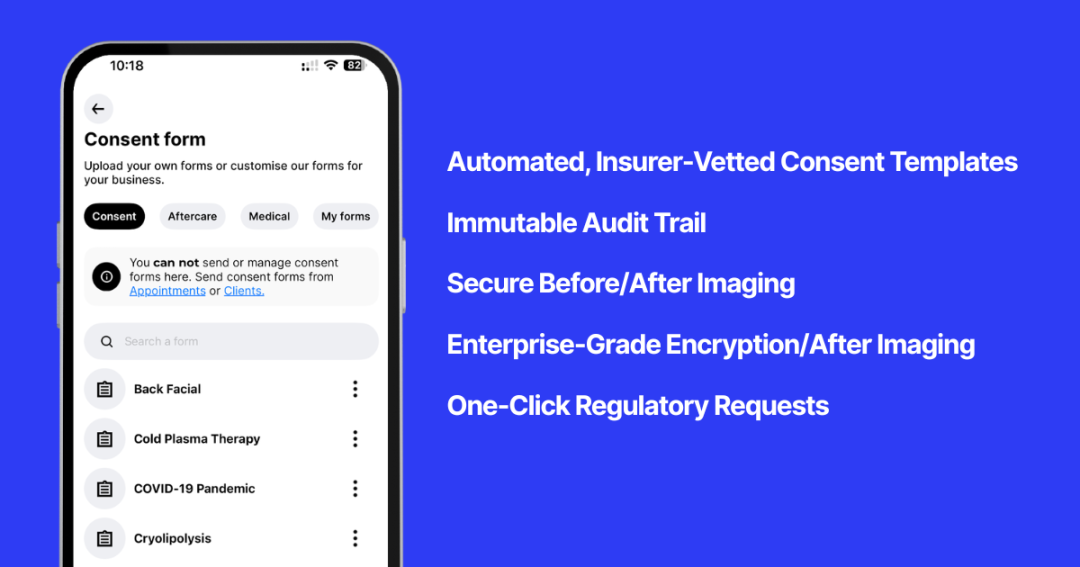In the ever-growing medical-aesthetic industry, the stakes are high when it comes to consent in medical aesthetics, compliance, and insurance. A small oversight—such as a missing checkbox on a consent form or an unencrypted patient record—can lead to catastrophic financial and legal consequences. Medical aesthetic clinics risk crippling liabilities and leaving patients vulnerable to substandard care if their administrative processes aren’t airtight.
That’s where Faces, a digital consent management platform, steps in. With automated workflows, insurer-approved documentation, and robust compliance features, Faces helps eliminate risks by streamlining consent, ensuring compliance, and offering peace of mind.

The Hidden Cost of Inadequate Consent
26% of Claims Are Preventable
In the UK, over a quarter of medical aesthetic liability claims arise from incomplete consent documentation, be it missing dates, unchecked risk acknowledgements, or absent signatures. When consent forms lack clarity or fail to meet regulatory standards, insurers often deny coverage. This forces clinics into costly legal battles and reputational damage.
A Single Oversight Can Void Your Insurance
Imagine dedicating years to building a reputable aesthetic practice, only to have your insurance policy voided because a patient’s digital signature wasn’t properly timestamped or linked to an IP address. In these scenarios, practitioners are left holding full financial responsibility for any adverse outcomes. Faces removes this risk by capturing every detail—date, time, IP address, device metadata, and version history—ensuring that consent forms remain unassailable under scrutiny.
Regulatory Minefields: GDPR & HIPAA
41% of UK Organisations Aren’t Meeting GDPR Standards
Despite the attention surrounding GDPR compliance, 41% of UK organisations admit they don’t fully comply with its requirements, putting patient data privacy and clinic reputations at risk. Faces ensures your clinic is always compliant with GDPR, reducing the chance of data breaches that could result in massive fines and reputational damage.
Over Half of U.S. Providers Fail Basic HIPAA Rules
Across the U.S., over half of healthcare providers still fail to meet HIPAA’s “Right of Access” standards, leaving patients unable to access or correct their own medical records. Non-compliance with HIPAA can result in penalties of up to $1.5 million per year. Faces simplifies compliance by automatically anonymising patient data when needed and securely handling sensitive information by HIPAA guidelines.
The NHS Liability Tsunami
£2.8 Billion Payout in 2023–24
In 2023–24, the NHS paid out a record £2.8 billion in clinical negligence compensation, the second-highest liability after nuclear decommissioning. These figures highlight the risks associated with inadequate documentation in medical procedures. With Faces, practices can ensure robust audit trails, prevent incomplete consent issues, and safeguard against costly legal actions.
Spotlight on Maternity Claims
Maternity-related claims alone accounted for more than £1.6 billion of NHS negligence payouts. Medical aesthetic risks in these high-stakes areas demand flawless documentation and verification of consent, from risk discussions to follow-up care. With Faces, every detail—photos, consent forms, and notes—is securely recorded, providing a bulletproof defence against potential claims.
Why Traditional Systems Fail
Manual Checklists Break Down
Manual consent forms are often prone to errors—such as lost documents, unchecked fields, and missing signatures—which can result in medical liability claims. These issues introduce unnecessary risks to both patient safety and practice solvency.
Data Silos Hinder Visibility
When data like photos, patient records, and consent forms are stored in separate systems, crucial links can vanish, making it difficult to prove consent. Faces integrates these elements seamlessly, ensuring that all documentation is centralised and easily accessible.
Lack of Real-Time Compliance Insight
Without a dashboard for real-time oversight, clinics remain unaware of gaps in consent or compliance until it’s too late, such as during an insurance audit or legal claim. Faces’ system offers comprehensive insights into compliance status, ensuring your clinic stays ahead of potential risks.
Security Shortfalls
Unencrypted PDFs, unsecured storage, and inadequate version control leave clinics vulnerable to data breaches and fines. Faces offers enterprise-grade encryption, ensuring all patient data remains secure and in compliance with GDPR and HIPAA standards.

Faces: Your Built-In Digital Compliance Officer
Automated, Insurer-Vetted Consent Workflows
With Faces, clinics can access pre-vetted consent templates that meet the exacting standards of over 10 leading medical insurers. These templates cover everything—from material risks to alternative treatments—ensuring compliance with both HIPAA and GDPR regulations before any form is sent.
Immutable Audit Trail
Each consent transaction is recorded with a timestamp, IP address, device type, and version history, ensuring that no detail can be contested. This immutable audit trail makes it easy for practices to defend against claims and maintain insurer-approved documentation.
Secure Before/After Imaging
Faces automatically watermarks and timestamps client photos, linking them with the corresponding consent forms. This seamless integration ensures that before/after imaging disputes are resolved, and insurance companies can trust the documented evidence in case of a claim.
Enterprise-Grade Encryption
All patient data, both at rest and in transit, is protected by AES-256 encryption—the gold standard for safeguarding sensitive information. Faces ensures that your clinic is fully compliant with GDPR and HIPAA.
One-Click Regulatory Requests
Whether it’s a GDPR Subject Access Request or a HIPAA Right of Access, Faces empowers you to quickly export, anonymize, or delete records in compliance with the regulations. This feature eliminates manual hassles and audit anxiety for clinic staff.
Insurers’ Secret: They Trust Faces
Insurance carriers don’t just accept Faces—they actively endorse it. By ensuring that consent forms are complete and compliant, Faces reduces insurance claim denials tied to administrative errors. This leads to fewer overturned payouts, lower legal costs, and stronger relationships between insurers and clinics.
Patient Care Elevated
With administrative risks minimized, medical aesthetics professionals can:
- Focus on patient communication, not chasing signatures.
- Spend more time delivering clinical excellence instead of checking compliance boxes.
- Build stronger patient trust, knowing their data is secure.
Patients benefit from transparent discussions, timely follow-ups, and easy access to their medical records, resulting in enhanced patient satisfaction, loyalty, and referrals.
Conclusion: A New Standard in Safety and Compliance
Medical aesthetic professionals are at a crossroads. Will they continue risking liabilities due to outdated manual processes, or will they embrace a digital compliance platform that unites consent management, audit trails, and patient care in one seamless workflow?
With Faces, clinics gain:
- Rock-solid consent that insurers demand.
- End-to-end auditability for every signature, photo, and data export.
- Enterprise-grade security that meets GDPR, HIPAA, and beyond.
- Peace of mind, allowing you to focus on delivering exceptional patient outcomes.
Don’t let a missing checkbox or unencrypted file undermine your practice or your patients. Switch to Faces today and set the industry standard for safety, compliance, and care.
FAQs:
1. What happens if consent forms are incomplete in medical aesthetics?
Incomplete consent forms can result in denied insurance claims, legal disputes, and significant reputational damage. It’s crucial to ensure every detail is documented accurately.
2. How can digital consent workflows help with compliance?
Digital consent workflows automate the collection of patient consent, ensuring it meets both HIPAA and GDPR standards. This minimizes human error and improves overall compliance.
3. Why is consent so critical in medical aesthetics?
Consent is critical because it protects both the patient and the clinic. It ensures the patient understands the risks involved in treatments and safeguards the practice against legal claims.
4. What are the risks of non-compliance with HIPAA and GDPR in aesthetics?
Non-compliance with HIPAA and GDPR can result in heavy fines, legal actions, and damaged reputations. For example, HIPAA violations can lead to penalties of up to $1.5 million annually.
5. How does Faces support compliance in medical aesthetics?
Faces offers automated, insurer-approved consent templates, an immutable audit trail, and enterprise-grade encryption, ensuring that clinics remain fully compliant with regulations.
6. How can digital consent reduce insurance claim denials?
Digital consent helps ensure that all forms are properly completed, timestamped, and securely stored, reducing administrative errors that lead to insurance claim denials.